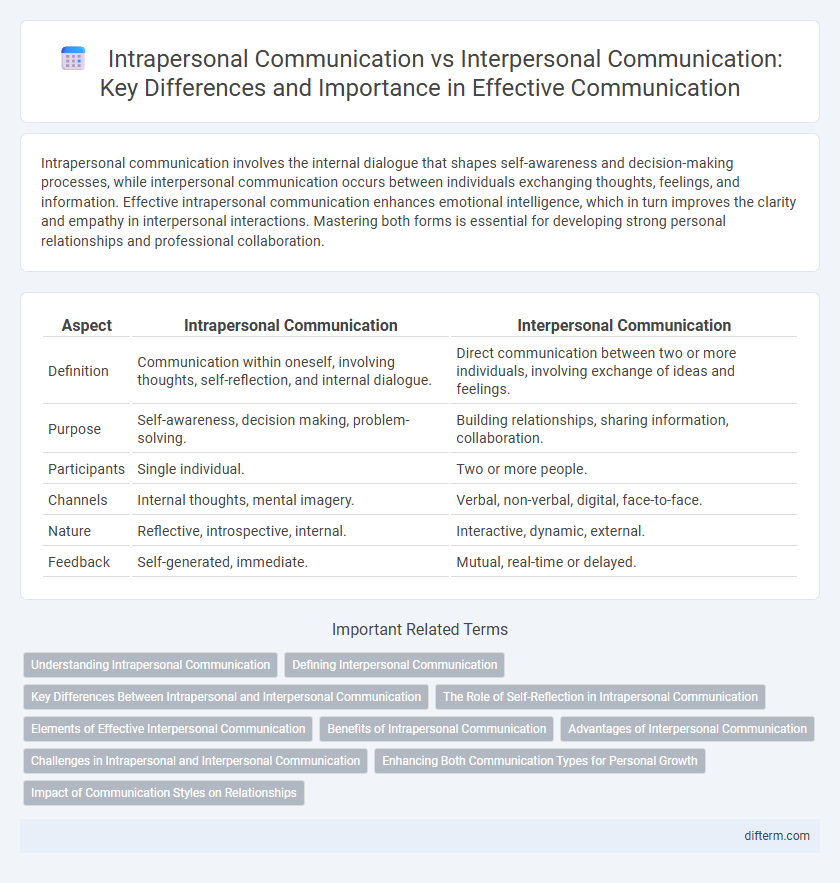Intrapersonal communication involves the internal dialogue that shapes self-awareness and decision-making processes, while interpersonal communication occurs between individuals exchanging thoughts, feelings, and information. Effective intrapersonal communication enhances emotional intelligence, which in turn improves the clarity and empathy in interpersonal interactions. Mastering both forms is essential for developing strong personal relationships and professional collaboration.
Table of Comparison
| Aspect | Intrapersonal Communication | Interpersonal Communication |
|---|---|---|
| Definition | Communication within oneself, involving thoughts, self-reflection, and internal dialogue. | Direct communication between two or more individuals, involving exchange of ideas and feelings. |
| Purpose | Self-awareness, decision making, problem-solving. | Building relationships, sharing information, collaboration. |
| Participants | Single individual. | Two or more people. |
| Channels | Internal thoughts, mental imagery. | Verbal, non-verbal, digital, face-to-face. |
| Nature | Reflective, introspective, internal. | Interactive, dynamic, external. |
| Feedback | Self-generated, immediate. | Mutual, real-time or delayed. |
Understanding Intrapersonal Communication
Intrapersonal communication involves the internal dialogue and self-reflection processes that shape an individual's thoughts, emotions, and decision-making. This form of communication is crucial for self-awareness, enabling a person to evaluate experiences and regulate behaviors before engaging in external interactions. Understanding intrapersonal communication enhances emotional intelligence and improves clarity in interpersonal exchanges by fostering a deeper connection with one's own cognitive and emotional states.
Defining Interpersonal Communication
Interpersonal communication refers to the dynamic exchange of messages between two or more individuals, emphasizing verbal and nonverbal cues used to build relationships and convey emotions. Unlike intrapersonal communication, which occurs within a person's mind, interpersonal communication involves direct interaction influenced by social, cultural, and contextual factors. Effective interpersonal communication enhances understanding, trust, and collaboration among participants in various personal and professional settings.
Key Differences Between Intrapersonal and Interpersonal Communication
Intrapersonal communication involves self-reflection and internal dialogue, focusing on processing thoughts and emotions within an individual. Interpersonal communication requires direct interaction between two or more people, emphasizing verbal and non-verbal exchanges to convey messages effectively. Key differences include the intrapersonal process being internal and solitary, while interpersonal communication is external and social, involving feedback and mutual understanding.
The Role of Self-Reflection in Intrapersonal Communication
Self-reflection in intrapersonal communication plays a critical role in enhancing self-awareness and emotional regulation by allowing individuals to critically analyze their thoughts and feelings internally. This introspective process improves decision-making and problem-solving skills, fostering personal growth and mental clarity. Unlike interpersonal communication, which relies on external feedback, self-reflection is a solitary exercise that strengthens inner dialogue and promotes psychological resilience.
Elements of Effective Interpersonal Communication
Effective interpersonal communication relies on key elements such as active listening, clear verbal expression, and nonverbal cues including body language and facial expressions, which enhance message clarity and emotional understanding. Feedback mechanisms play a crucial role by allowing participants to confirm or adjust messages, ensuring mutual comprehension and trust. Context-awareness and empathy further deepen connections, enabling tailored communication that respects individual perspectives and fosters meaningful interactions.
Benefits of Intrapersonal Communication
Intrapersonal communication enhances self-awareness by allowing individuals to reflect on their thoughts and emotions, leading to better decision-making and problem-solving skills. It fosters emotional regulation, reducing stress and improving mental health by clarifying internal conflicts before interacting with others. This internal dialogue strengthens personal insight, ultimately contributing to more meaningful and effective interpersonal communication.
Advantages of Interpersonal Communication
Interpersonal communication enhances collaboration and relationship-building by allowing direct exchange of ideas and emotions, fostering trust and mutual understanding. It supports immediate feedback, reducing misunderstandings and improving problem-solving efficiency. Engaging in interpersonal communication also promotes social skills development and emotional intelligence.
Challenges in Intrapersonal and Interpersonal Communication
Challenges in intrapersonal communication include distorted self-perception and cognitive biases that hinder accurate self-reflection, impacting decision-making and emotional regulation. Interpersonal communication faces obstacles such as misinterpretations caused by cultural differences, emotional barriers, and lack of active listening, leading to conflicts and reduced trust. Overcoming these challenges requires developing self-awareness, empathy, and effective listening skills to enhance clarity and connection in both communication types.
Enhancing Both Communication Types for Personal Growth
Enhancing intrapersonal communication sharpens self-awareness by fostering reflection and emotional regulation, which strengthens decision-making and self-motivation. Improving interpersonal communication optimizes active listening, empathy, and clarity in interactions, leading to stronger relationships and conflict resolution skills. Integrating mindfulness techniques and feedback mechanisms supports growth in both communication types, promoting overall personal development.
Impact of Communication Styles on Relationships
Intrapersonal communication shapes self-awareness and emotional regulation, directly influencing how individuals perceive and respond to others in relationships. Interpersonal communication styles determine the effectiveness of message exchange, conflict resolution, and emotional connection between parties. Understanding and adapting communication styles enhances relationship satisfaction and reduces misunderstandings.
intrapersonal communication vs interpersonal communication Infographic

 difterm.com
difterm.com